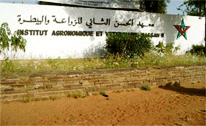|

|
Hassan
II Agronomic and Veterinary Institute
(Morocco)

|
 |
|
| |
 Introduction Introduction

Created
in 1966 to train agronomical engineers, the Hassan II Agronomic
and Veterinary Engineers quickly evolved into a polytechnic institute
with a triple mission of training, research, and contribution
to development.
 Activities Activities
In
the area of education, the system in place combines one year
preparatory to higher studies in agriculture and five years
of agronomic studies, which allows for the obtaining of the
degree in six years of study after the Bachelor’s of
Science in Specialized Agronomic Engineering. The Hassan II
AVI also provides training of Doctors of Agronomic Science
and Specialized Technicians.
Research is
organized at three levels; post-graduate degree research, conducted
via the writing of around 250 final dissertations and
theses per year; doctoral research; and contractual research.
These research activities cover the scientific area of living
things and the earth, agricultural engineering, agro alimentary
engineering, and topographical engineering, as well as management.
To fulfill its objectives, the Hassan II AVI employs 35 scientific
departments spread across two campuses, one in Rabat and the
other at Agadir. It possesses computer centers, one agricultural
documentation center, and a publishing center, the diffusion
of scientific and technical information being a major and constant
priority for this institution.
In the area of economic and social sciences, the Hassan II AVI
possesses a department called the Department of Human Sciences
(DSH), which provides, among other things, the training of fifteen
agronomic engineers specializing in agro-economics per year.
This training, which operates according to the credit hour system,
is based on two post-graduate years; the first is dedicated 2/3
to common education and 1/3 to education in two new options (Economics
and Management of Agricultural and Agro-alimentary Businesses,
and Engineering of Agricultural and Rural Development); the second
year is completely dedicated to the writing of a final dissertation.
 Teaching team
Teaching team
To
fulfill its objectives, this department employs a group of
twenty teacher-researchers specializing in various disciplines
(geography, sociology, economics, econometrics, agro-economics,
agricultural and rural development project analysis, etc.),
of which 6 are directly involved in rural development training.
The department also utilizes associate and visiting teacher-researchers
specializing in certain disciplines (institutional audit,
law and rural institutions, quality management, etc.). All
of these educators speak perfect French and some of them
speak English as well; half of them are proficient in computers
and one course is currently conducted long-distance via the
use of the Internet in teaching and training.
In
terms of equipment, the department has a computer laboratory
available to students with 10 PCs and 1 printer. This laboratory
is also used for all courses in the department; the computers
are thus rarely available to students of rural development.
 Interest
of FORMDER project for the institution Interest
of FORMDER project for the institution
For the
DSH of the Hassan II AVI, its participation in the FORMDER
project is an opportunity that fits perfectly into the process
of educational reform in which it is currently engaged. This
program will allow it, in particular, to give its students
and teacher-researchers the benefit of the experience and expertise
of partner universities as it reforms, particularly in regard
to the Engineering of Agricultural and Rural Development option.
The FORMDER project also fits perfectly into the reform of Moroccan education
(Law 01-00 of May 19, 2000, effective as of 2003), which is aimed particularly
at reformulating educational organization on the basis of the following objectives :
• Better inter-institutional integration, particularly via the implementation
of core syllabi and interfaces ;
• Identification of appropriate subsidiaries with development needs in
the country ;
• Organization of training in module form accessible to the learner ;
• Implementation of syllabi based on orientation, evaluation, and reorientation
;
• Use of new computer and communication technologies.
According to this logic, the FORMDER project could, in
some way, constitute a pilot project for the AVI, which
would integrate new orientations defined by the Moroccan
state.

|
|
|
|
|
|
